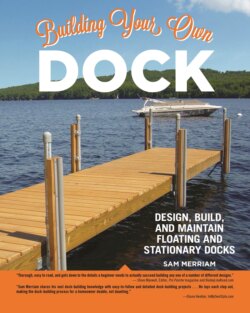Читать книгу Building Your Own Dock - Sam Merriam - Страница 10
На сайте Литреса книга снята с продажи.
Special Safety Measures
ОглавлениеFrom start to finish, operating safely is the most important objective through the process for any project. I always encourage people to follow the safety precautions that come with any of the equipment you’ll be using. From my years of working on docks, hearing about or bearing witness to human failures, I want to share with you some precautions specific to working on or around the water.
• When it’s strength you lack, someone should “have your back.” Objects too heavy for you deserve patience and additional help.
• Even the best swimmer should wear a life vest when working where the water’s deep. Have you ever tread water with work boots on? I hope you’ll never have to.
• Seatbelts saves lives; safety glasses saves eyes. Eye injuries are caused by the “darndest” things—the thing you weren’t expecting.
• Sandals are shoddy shoes for doing dock work. Covering your bases means covering your feet.
• Know where you’re stepping. On the golf course, try for a hole in one. On the jobsite, don’t be the one in the hole.
Most of the dock methods featured in this book are comprised of portable, standard-size sections.
• Good gloves means glad hands. Be prepared—you may not know entirely what your hands will get into.
• On the pond or pool, the fool holds a corded tool. Stick with cordless tools when near or over water.
• When there is lightning about, it’s time to clear out. I know the job is important to you, but so is your life.
• Overhead and under feet, no power line is safe to meet. Be aware of all electrical lines near your work. Sometimes it’s easy to assume there is none near the water—you should never assume.
• If it’s windy and choppy, the dock work is sloppy. Choose your time of day wisely. The work goes much better when conditions are calm.
• Onlookers are obstacles. We can’t blame them for wanting to watch, just keep them at a safe distance.
• Critters count. Always treat wildlife and pets with respect. Their safety is important too.
• Buddies are the best. Working alone leaves no one to help if you get into trouble.
• Is your equipment right or will it bite? Make sure your tools are all in good working order and safe to use.
• Secure the scene. Leaving your jobsite on the fly, considers not the passerby. Defuse all traps before you go, moor what matters the wind could blow. For the short time you’re away could make or break someone’s day.
